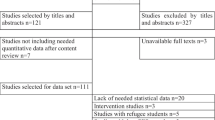Abstract
A study to evaluate the relationship between the spiritual intelligence and adjustment among the college students was conducted on a sample of 250 students in six various colleges of Tuticorin district, Tamil Nadu, India. Gender, religion, community, major subject, educational qualification of father and mother, student locality, college type, father and mother’s occupation and monthly family income (n = 11 variables) were chosen for the study. Test of significance for spiritual intelligence and adjustment was studied and found them nonsignificant except student locality, found to be significant. Two valid and reliable instruments were used to assess student’s spiritual intelligence and adjustment. Correlation and Chi-square analysis using structural equation model were used to analyze these data. Correlation analysis showed significant relationship between the variables among the college students (n = 250). Chi-square analysis of association between adjustments of college students showed that most variables are nonsignificant unlike father’s educational qualification and mother’s occupation. The results disclosed the significant positive relationship with spiritual intelligence and adjustment among adolescents.
Similar content being viewed by others
References
Adeyemo, D. A. (2007). Emotional intelligence and the relationship between job satisfaction and organizational commitment of employee in public parastatals in Oyo State, Nigeria. Pakistan Journal of Social Sciences, 4, 324–330.
Adeyemo, D. A. (2008). Demographic characteristics and emotional intelligence among workers in some selected organizations in Oyo State, Nigeria. Vision: The Journal of Business Perspective, 12, 43–48.
Akinboyeet, J. O., Akinboye, D., & Adeyemo, D. A. (2002). Coping with stress in life and workplace (pp. 107–120). Nigeria: Stirling Horden Publishers.
Amrai, K., Farahani, A., Ebrahimi, M., & Bagherian, V. (2011). Relationship between personality traits and spiritual intelligence among university students. Procedia Social and Behavioral Sciences, 15, 609–612.
Animasahun, R. A. (2010). Intelligent quotient, emotional intelligence and spiritual intelligence as correlates of prison adjustment among inmates in Nigeria prisons. Journal of Social Science, 22, 121–128.
Astin, A. W. (1984). Student involvement: A development theory for higher education. Journal of College Student Personnel, 22, 297–308.
Bhangale, S. D., & Mahajan, S. R. (2013). Spiritual intelligence—Emerging issue in education. Edubeam multidisciplinary-Online Research Journal, 9, 1–3.
Delavar, A. (2010). The basic theory of the methodology in humanistic studies. Tehran: Roshd Publication.
Goleman, D. (1998). Working with emotional intelligence. New York: Bantam Books.
Goltfredson, L. S. (1998). The general intelligence factor. Scientific American Presents, 9, 24–29.
Gupta, G. (2012). Spiritual intelligence and emotional intelligence in relation to self-efficacy and self-regulation among college students. International Journal of Social Sciences and Interdisciplinary Research, 1, 60–69.
Ishak, N. A., Jdaitawi, M. T., Ibrahim, Y. S., & Mustafa, F. T. (2011). Moderating effect of gender and age on the relationship between emotional intelligence with social and academic adjustment among first year university students. International Journal of Psychological Studies, 1, 78–89.
Jain, M., & Meena, S. (2013). A study on relationship of spiritual intelligence and adjustment of adolescents. Indian Journal of Psychological Science, 3, 12–16.
Kaplan & Sadok. (2007). The summary of psychology (F. Rezaiee Trans.). Tehran: Arjmand Publication (2010).
Kaur, G., & Singh, R. P. (2013). Spiritual intelligence of prospective engineers and teachers in relation to their gender, locality and family status. Educationia Confab, 2, 27–43.
Kelley, B. S., & Miller, L. (2007). Life satisfaction and spirituality in adolescents. Research in the Social Scientific Study of Religion, 18, 233–262. (cited by: Hasnain, N., Ansari, S. A., & Samantray 2011. European Journal of Social Sciences, 20, 434).
Khavari, K. A. (2000). Spiritual intelligence: A practical guide to personal happiness. Canada: White Mountain Publications.
Mahasneh, A. M., Shammout, N. A., Alkhazaleh, Z. M., Al-Alwan, A. F., & Abu-Eita, J. D. (2015). The relationship between spiritual intelligence and personality traits among Jordanian university students. Psychology Research and Behavior Management, 8, 89–96.
Mayer, J. D., Caruso, D. R., & Salovey, P. (2000). Emotional intelligence meets traditional standards for an intelligence. Intelligence ISSN: 0160-2896, 27, 267–298.
Salovey, P., & Mayer, J. D. (1990). Emotional Intelligence, Imagination, Cognition and Personality, 9, 185–211. (Cited by: Amram, J. 2005, Intelligence beyond IQ: The contribution of Emotional and Spiritual Intelligences to effective business leadership, Institute of Transpersonal Psychology, 1).
Schutte, N. S., Malouff, J. M., Hall, L. E., Haggerty, D. J., Cooper, J. T., Golden, C. J., et al. (1998). Development and validation of a measure of emotional intelligence. Personality and Individual Differences, 25, 167–177.
Slas, C. (1993). Social and emotional adjustment of adolescents extremely talented in verbal and mathematical reasoning. Journal of Youth and Adolescence, 15, 1–18.
Tate, D., & Forchheimer, M. (2002). Quality of life, life satisfaction and spirituality: Comparing outcomes between rehabilitation and cancer patients. American Journal of Physical and Medical Rehabilitation, 81, 400–410.
Tinto, V. (1987). Leaving college: Rethinking the causes and cures of student attribution. Chicago: University of Chicago Press.
Wigglesworth, C. (2002). Spiritual intelligence and why it matters. Bellaire, TX: Conscious Pursuit Inc.
Zohar, D., & Berman, M. (2001). Developing spiritual intelligence through ELT. Paper presented at the Brighton IATEFI Conference.
Zohar, D., & Marshall, I. (2000). SQ: Spiritual intelligence, the ultimate intelligence. New York: Bloomsbury.
Acknowledgments
The author is thankful to the Principal and Dean, Annammal College of Education for their immense support to complete this study within the stipulated period.
Author information
Authors and Affiliations
Corresponding author
Rights and permissions
About this article
Cite this article
Devi, R.K., Rajesh, N.V. & Devi, M.A. Study of Spiritual Intelligence and Adjustment Among Arts and Science College Students. J Relig Health 56, 828–838 (2017). https://doi.org/10.1007/s10943-016-0225-8
Published:
Issue Date:
DOI: https://doi.org/10.1007/s10943-016-0225-8




